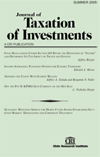Tax Consequences of Distressed Debt Investing
Author: Russell E. Nance.; Daniel R. Read.
Source: Volume 26, Number 03, Spring 2009 , pp.3-21(19)

next article > |return to table of contents
Abstract:
Investing in distressed debt instruments is not a new practice. However, current financial conditions have created an abundance of opportunities for such investments, resulting in an intense focus from potential investors of all kinds. Coupled with the burgeoning interest in distressed debt is a need to understand the tax consequences of these investments—consequences that are not always intuitive. This article discusses the fundamental tax consequences to investors of these distressed debt investments. The first part of this article discusses the general tax treatment of investors upon receipt of payments on distressed debt investments, and how general and well established tax principles are implicated by investments in these assets. There follows a discussion of the various tax issues involved in actively working out distressed debt investments. The last part of this article addresses the interaction of the two regimes that could be implicated in dealing with a loss on a distressed debt investment: the worthless security rules and the bad debt deduction.Keywords: Original issue discount; deferral of gain; IRS section 165(g); Section 166
Affiliations:
1: Mayer Brown; 2: Mayer Brown.